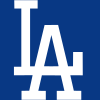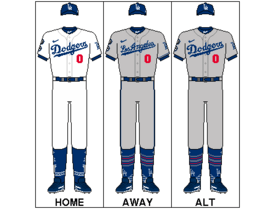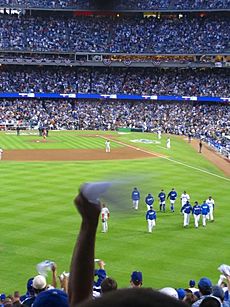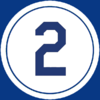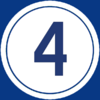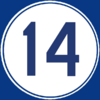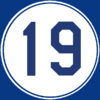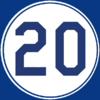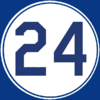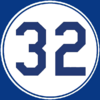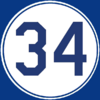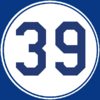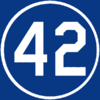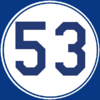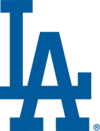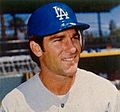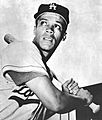Los Angeles Dodgers facts for kids
Quick facts for kids Los Angeles Dodgers |
|||||
|---|---|---|---|---|---|
|
|||||
|
|||||
| Major league affiliations | |||||
|
|||||
| Current uniform | |||||
| Retired numbers | |||||
| Colors | |||||
|
|||||
| Name | |||||
|
|||||
| Ballpark | |||||
|
|||||
| Major league titles | |||||
| World Series titles (9) |
|
||||
| NL Pennants (26) |
|
||||
| AA Pennants (1) | 1889 | ||||
| West Division titles (23) |
|
||||
| Chronicle-Telegraph Cup (1) |
|
||||
| Wild card berths (3) |
|
||||
| Front office | |||||
| Principal owner(s) | Guggenheim Baseball Management Mark Walter (chairman) |
||||
| President | Stan Kasten | ||||
| President of baseball operations | Andrew Friedman | ||||
| General manager | Brandon Gomes | ||||
| Manager | Dave Roberts | ||||
The Los Angeles Dodgers are a professional baseball team from Los Angeles, California. They play in Major League Baseball (MLB) as part of the National League (NL) West Division. The Dodgers are one of the most successful teams in baseball history. They have won nine World Series championships and a record 26 National League pennants. In 2024, Forbes magazine said the Dodgers were the second most valuable team in MLB, worth $5.45 billion.
The team started in 1883 in Brooklyn, New York. They joined the NL in 1890 and were first called the Brooklyn Bridegrooms. They used other names before becoming the Brooklyn Dodgers in 1932. A very important moment happened in 1947 when Jackie Robinson joined the team. He was the first African American to play in the Major Leagues since 1884. This helped break down racial barriers in sports. From the 1940s to the mid-1950s, the Dodgers had a big rivalry with the New York Yankees. The Dodgers won their first World Series title in 1955 against the Yankees.
After 68 seasons in Brooklyn, the team moved to Los Angeles before the 1958 season. They played their first four seasons at the Los Angeles Memorial Coliseum. In 1962, they moved to their current home, Dodger Stadium. The Dodgers quickly found success in Los Angeles, winning the 1959 World Series. Star pitchers Sandy Koufax and Don Drysdale helped them win more titles in 1963 and 1965. In 1956, Don Newcombe was the first player to win both the Cy Young Award and the NL MVP in the same year. In 1981, rookie pitcher Fernando Valenzuela became a huge star and led the team to another championship. He is still the only player to win both the Cy Young and Rookie of the Year awards in the same season. The Dodgers won again in 1988. They surprised many by beating stronger teams.
The team then had a 32-year wait for another championship. But they still made it to the playoffs many times. They won eight division titles in a row from 2013 to 2020. This wait ended when the Dodgers won the 2020 World Series. The Dodgers signed global sensation Shohei Ohtani in 2024. He set league and team records, helping them win their eighth World Series title in 2024 and their ninth in 2025, during his first two seasons with the team.
Many Dodgers players have won major awards. Eleven players have been named NL MVP. Eight Dodgers pitchers have won a total of 12 Cy Young Awards. This is the most for any MLB team. The Dodgers also have 18 Rookie of the Year Award winners. This is twice as many as the next team. This includes four Rookies of the Year in a row from 1979 to 1982. It also includes five in a row from 1992 to 1996. From 1884 through 2024, the Dodgers' overall record was 11,432 wins and 10,068 losses. Since moving to Los Angeles in 1958, their record was 5,808 wins and 4,778 losses through the end of 2024.
The Dodgers have many fans and have always been one of the strongest teams in the National League. Their rivalry with the San Francisco Giants started when both teams were in New York City.
Contents
Team History and Major Milestones
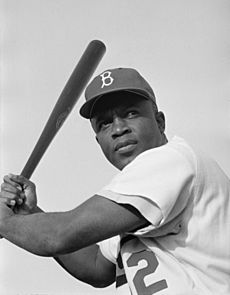
The club began in 1883 as the Brooklyn Baseball Association. They played in the Interstate League. In 1884, they joined the major league American Association. Then, in 1890, they moved to the National League.
The team had many unofficial nicknames before 1932. These included the Bridegrooms, Superbas, and Robins. In the early 1900s, a sportswriter called them the Trolley Dodgers. This name came from Brooklyn people who had to dodge streetcars. The Dodgers nickname was officially chosen in 1932.
In 1941, the Dodgers won their third National League pennant. However, they lost to the New York Yankees. This started a big rivalry. The Dodgers played the Yankees in their next six World Series appearances.
Jackie Robinson's Impact
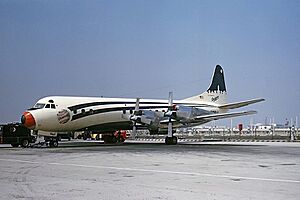
For many years, no African American players were allowed in Major League Baseball. Jackie Robinson changed this. He became the first African American to play in a major league game on April 15, 1947. He played for the Brooklyn Dodgers. This happened thanks to general manager Branch Rickey, who believed it was the right thing to do.
This event was a huge step for sports in the United States. It also helped the American Civil Rights Movement. Robinson was an amazing player. He was fast and played with great energy. He won the first Rookie of the Year award. This award is now named the Jackie Robinson Award in his honor. The Dodgers were willing to have black players when most other teams were not. This helped them win six pennants between 1947 and 1956. They had help from Robinson, three-time MVP Roy Campanella, and Cy Young Award winner Don Newcombe. Robinson later became the first African American elected to the Baseball Hall of Fame in 1962.
Moving to California
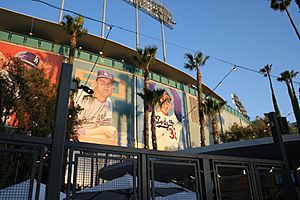
After the 1957 season, the team left Brooklyn. The Dodgers' owner, Walter O'Malley, wanted to build a new, modern stadium in Brooklyn. But city leaders did not agree to his plans. Los Angeles officials then offered O'Malley a chance to buy land for a new ballpark. This would give him full control over the team's income. O'Malley decided to move the Dodgers to California. He also convinced the Giants owner to move his team to San Francisco. This kept their rivalry alive on the West Coast. They were the first MLB teams to play west and south of St. Louis.
The Dodgers played their last game at Ebbets Field on September 24, 1957. They won 2–0 against the Pittsburgh Pirates. New York had only one team, the New York Yankees, until 1962. That year, the New York Mets were founded. They brought National League baseball back to the city. The Mets even used Dodgers blue in their team colors.
Los Angeles Dodgers Era
The Dodgers were the first Major League Baseball team to play in Los Angeles. On April 18, 1958, they played their first game in Los Angeles. They beat the San Francisco Giants 6–5. Over 78,000 fans watched at the Los Angeles Memorial Coliseum.
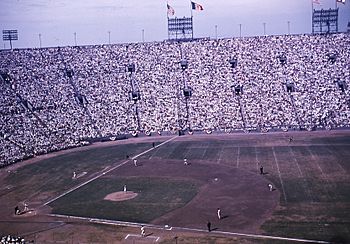
Dodger Stadium was ready for Opening Day in 1962. Its simple design and beautiful setting among hills and palm trees made it famous. The stadium's large playing field helped the Dodgers. They built a team that was excellent at pitching.
Since moving to Los Angeles, the Dodgers have won twelve more National League Championships. They have also won seven more World Series rings. The Dodgers have had only three top-five draft picks since the MLB Draft began in 1965.
Major Team Rivalries
The Dodgers have many exciting rivalries with other teams. These rivalries make baseball games even more thrilling.
Rivalry with San Francisco Giants
The Dodgers–Giants rivalry is one of the oldest and most intense in sports. It started in the late 1800s when both teams were in New York City. The Dodgers played in Brooklyn and the Giants in Manhattan. When both teams moved to California in 1958, the rivalry continued. The cities of Los Angeles and San Francisco have long been rivals. This made the baseball rivalry even stronger.
This rivalry is special because both teams have been successful for a long time. The Giants have more wins in team history. But the Dodgers have won more National League pennants, with 26 compared to the Giants' 23. Both teams are now tied with nine World Series titles. The Giants won their first championship in California in 2010. The Dodgers' most recent title was in the 2025 World Series.
In 2021, both teams had amazing seasons. The Giants won 107 games, and the Dodgers won 106. They met in the playoffs for the first time ever in the NLDS. The Dodgers won that series.
Rivalry with San Diego Padres
The Padres rivalry with the Dodgers has often seen the Dodgers win more. However, recent games have become very competitive. This adds excitement due to the closeness of Los Angeles and San Diego.
The Dodgers lead the overall series against the Padres. The two teams have met in the playoffs three times. The Dodgers won in the 2020 NLDS and the 2024 NLDS. The Padres won in the 2022 NLDS.
Rivalry with Arizona Diamondbacks
The rivalry between the Dodgers and the Arizona Diamondbacks was very strong for many years. This was especially true in the 2010s. Both teams often fought for the division title. This led to many heated moments and even some fights between players.
In 2013, the Dodgers celebrated winning the division by jumping into the pool at Chase Field. This made the Diamondbacks upset. In 2017, the Dodgers swept the Diamondbacks 3–0 in the 2017 National League Division Series. The Dodgers then went to the World Series. In 2023, the Diamondbacks swept the Dodgers 3–0 in the 2023 National League Division Series. The Diamondbacks then reached the World Series. The Dodgers lead the overall series. The teams are tied 3–3 in playoff games.
Rivalry with New York Yankees
The Dodgers' rivalry with the New York Yankees is one of the most famous in baseball. The two teams have played each other 12 times in the World Series. This is more than any other two teams from the American and National Leagues. The rivalry began when the Dodgers played in Brooklyn. After the Dodgers moved to Los Angeles in 1958, the teams represented the two largest U.S. cities.
The teams met in many World Series games. They did not play each other in a World Series for 40 years, from 1981 until 2024. They first played each other in a regular season game in 2004. Their last regular season meeting was in June 2024. The Dodgers won two out of three games in New York.
Rivalry with Houston Astros
The rivalry between the Dodgers and the Houston Astros started when they were in the same division. The rivalry became less intense when Houston moved to the American League. In 2017, the two teams played in the 2017 World Series. The Astros won in seven games. A controversy later arose about how the Astros gained an unfair advantage during that series. The Dodgers lead the overall series. The teams are tied 6–6 in playoff wins.
Fan Support and Community
When the Dodgers moved to Los Angeles, their attendance quickly grew. Team owner Walter O'Malley worried that Dodger Stadium might be too big. But the Dodgers led the league in attendance in 1962. They almost doubled the attendance of the New York Yankees.
In 2012, a Bleacher Report article said Dodgers fans were the best in Los Angeles.
Attendance Records
In 1978, the Dodgers were the first MLB team to have over three million fans in one season. They did this six more times before any other team reached three million fans total. The Dodgers had over three million fans for 15 seasons in a row, from 1996 to 2010. This is the longest streak in MLB. The team's biggest fan club, Pantone 294, often travels to away games to cheer for the Dodgers. The Dodgers have often been in the top three for attendance since 2000. They have led the league in attendance for nine straight seasons, starting in 2013.
On July 3, 2007, the Dodgers announced a record. Their total attendance since 1901 reached 175 million. This was a record for all professional sports. In 2007, the Dodgers set a team record for single-season attendance. They had over 3.8 million fans. On March 28, 2008, the Dodgers set a world record. They had the largest attendance for a single baseball game. This was an exhibition game against the Boston Red Sox. It was held at the Los Angeles Memorial Coliseum for the Dodgers' 50th anniversary. There were 115,300 fans there. In 2009, the Dodgers led MLB in total attendance. The Dodger baseball cap is always one of the top three best-selling caps.
Dodgers fans mostly come from Southern and Central California. They also come from parts of Southern Nevada. The fanbase has also grown in states like Arizona, New Mexico, and Western Texas. In 2015, Vivid Seats reported that the Dodgers were the most popular MLB team in Utah based on ticket sales. Dodgers away games often attract many fans who live far away or are traveling.
Many Hollywood celebrities attend home games. These include team co-owner Magic Johnson, Flea, Mary Hart, DaBaby, Tiger Woods, Alyssa Milano, Shia LaBeouf, George Lopez, Lana Del Rey, Mila Kunis, and Ashton Kutcher. Actor Bryan Cranston is also a lifelong Dodger fan.
| Year | MLB rank | Total attendance | Game average |
|---|---|---|---|
| 2004 | 2nd | 3,488,283 | 43,065 |
| 2005 | 2nd | 3,603,646 | 44,489 |
| 2006 | 2nd | 3,758,545 | 46,401 |
| 2007 | 2nd | 3,857,036 | 47,617 |
| 2008 | 3rd | 3,730,553 | 46,056 |
| 2009 | 1st | 3,761,653 | 46,440 |
| 2010 | 3rd | 3,562,320 | 43,979 |
| 2011 | 11th | 2,935,139 | 36,236 |
| 2012 | 5th | 3,324,246 | 41,040 |
| 2013 | 1st | 3,743,527 | 46,216 |
| 2014 | 1st | 3,782,337 | 46,695 |
| 2015 | 1st | 3,764,815 | 46,479 |
| 2016 | 1st | 3,703,312 | 45,719 |
| 2017 | 1st | 3,765,856 | 46,492 |
| 2018 | 1st | 3,857,500 | 47,042 |
| 2019 | 1st | 3,974,309 | 49,065 |
| 2020 | N/A | 0 | N/A |
| 2021 | 1st | 2,804,693 | 34,625 |
| 2022 | 1st | 3,861,408 | 47,671 |
| 2023 | 1st | 3,837,079 | 47,371 |
| 2024 | 1st | 3,941,251 | 48,657 |
International Fanbase
The Dodgers have many fans in Mexico. This is because of Mexican players like Fernando Valenzuela, Ismael Valdéz, and Julio Urias. Mel Almada, the first Mexican-born player in MLB, played for the Dodgers in 1939. About 54% of fans at home games are of Mexican descent. The team also gained Asian fans with players like Hideo Nomo, Hiroki Kuroda, Kenta Maeda, and Yu Darvish. The Dodgers signed Chan Ho Park, the first South Korean-born MLB player. In 2013, they signed All-Star pitcher Hyun Jin Ryu. The team works with Korean communities in Los Angeles. They started an annual Korean Heritage night in 2016. The Dodgers signed the first Taiwanese player in MLB, Chin-Feng Chen, in 2002. Other Taiwanese players like Chin-Lung Hu and Chin-Hui Tsao later joined.
The Dodgers signed Japanese star Shohei Ohtani. They then started special theme nights with Japanese companies. For example, Sanrio sponsored a Hello Kitty night. The national anthem was performed by Japanese musician Yoshiki. They also worked with VTuber agency Hololive. This happened during Los Angeles' Anime Expo.
Radio and Television Broadcasts
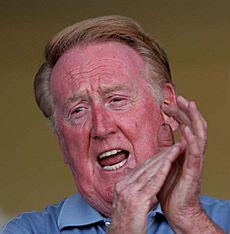
For many years, almost all Dodger games were called by Vin Scully. He was a famous and beloved broadcaster from 1950 to 2016. His longtime partners were Jerry Doggett and Ross Porter. In 1976, Dodgers fans chose him as the most memorable person in the team's history. He also won the Baseball Hall of Fame's Ford C. Frick Award in 1982. Scully was known for calling games by himself. He would often share interesting details about the players. Fans and critics loved him for his long career and fair view of every game. He often called his listeners "friends."
When Doggett retired in 1987, Don Drysdale replaced him. Drysdale was a Hall-of-Fame Dodgers pitcher. He sadly passed away in 1993. Former Dodgers outfielder Rick Monday then replaced him. Porter's time ended in 2004. After that, the team started using a play-by-play announcer and a color commentator. Scully, however, continued to announce games by himself.
Scully called about 100 games each season. These included all home games and road games in California and Arizona. He broadcasted on both radio and television. Scully retired from broadcasting in 2016. His 67 years with the Dodgers was the longest time any broadcaster spent with a single sports team. In 2017, Joe Davis became the new play-by-play announcer for television. Orel Hershiser joined him as the color commentator.
The Dodgers also broadcast games on radio in Spanish and Korean. In 1958, the Dodgers became the first MLB team with a Spanish-language radio station. Jaime Jarrín, another Frick Award winner, voiced the Spanish play-by-play from 1959 to 2022. Until his passing in 2024, former Dodger pitcher Fernando Valenzuela was a color analyst for some games. Valenzuela was joined in the Spanish booth in 2023 and 2024 by Pepe Yñiguez and José Mota. The Spanish-language radio station is KTNQ. The Dodgers' Korean broadcast began in 2013 on KMPC.
Team Management
- Owner: Guggenheim Baseball Management
- Chairman/Controlling Partner: Mark Walter
- Partner: Magic Johnson
- Partner: Peter Guber
- Partner: Todd Boehly
- Partner: Billie Jean King
- Partner: Ilana Kloss
- Partner: Robert Patton, Jr.
- Partner: Alan Smolinisky
- Partner: Robert L. Plummer
- President/chief executive officer: Stan Kasten
- President of Baseball Operations: Andrew Friedman
- General Manager: Brandon Gomes
Dodgers Managers
Since 1884, the Dodgers have had 31 managers. The current manager is Dave Roberts. He was appointed after the 2015 season.
For nearly 43 years, from 1954 to 1996, the Dodgers had only two managers. These were Walter Alston and Tommy Lasorda. Both are in the Hall of Fame. During this time, the Dodgers won 11 pennants and their first six World Series championships.
The managers of the Los Angeles Dodgers (1958–present) include:
- Walter Alston (1958–1976)
- Tommy Lasorda (1976–1996)
- Dave Roberts (2016–present)
Team Achievements and Honors
Retired Numbers
|
When a number is retired, no other player on that team can wear it. Koufax, Campanella, and Robinson were the first Dodgers to have their numbers retired. This happened on June 4, 1972. The Dodgers usually retire numbers of players who played most of their career with the team. These players are also usually in the Baseball Hall of Fame.
There have been a few exceptions:
- Manager Walter Alston's number was retired in 1977. He had won four World Series titles.
- Coach Jim Gilliam's number was retired in 1978, just two days after he passed away. He spent 28 years with the Dodgers.
- Pitcher and broadcaster Fernando Valenzuela's number was retired in 2023. He passed away in 2024. The Dodgers had not given his No. 34 to any new players for a long time. This was to honor his special role in Dodger history.
In 1997, Jackie Robinson's No. 42 was retired throughout all of Major League Baseball. He is the only player to receive this honor. On Jackie Robinson Day (April 15), many players and coaches wear number 42 to honor him.
The Dodgers also honor non-baseball people in their "Ring of Honor." Longtime broadcasters Vin Scully and Jaime Jarrín are honored with microphone symbols. Team owner Walter O'Malley is honored with the team's "LA" logo.
Team Captains
- Leo Durocher 1938–1941
- Pee Wee Reese 1950–1958
- Duke Snider 1962
- Maury Wills 1963–1966
- Davey Lopes 1978–1979
Baseball Hall of Famers
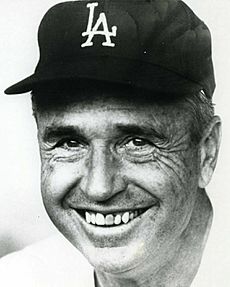
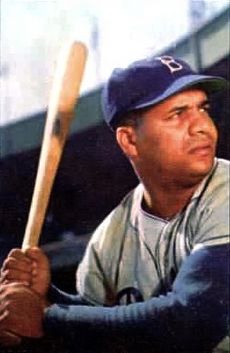
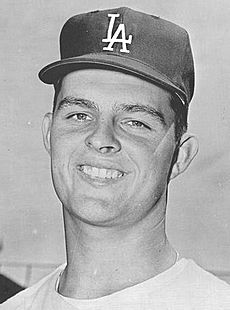
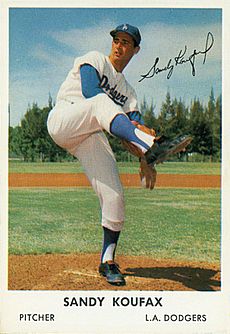
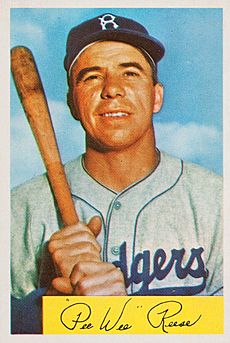
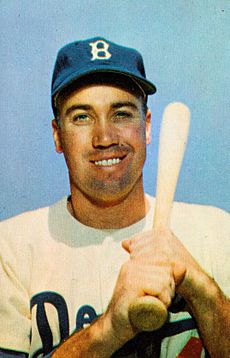
| Los Angeles Dodgers Hall of Famers | ||||||||||||||||||
|---|---|---|---|---|---|---|---|---|---|---|---|---|---|---|---|---|---|---|
| Affiliation according to the National Baseball Hall of Fame and Museum | ||||||||||||||||||
|
Ford C. Frick Award Recipients
| Los Angeles Dodgers Ford C. Frick Award recipients | |||||||||
|---|---|---|---|---|---|---|---|---|---|
| Affiliation according to the National Baseball Hall of Fame and Museum | |||||||||
|
Legends of Dodger Baseball
In 2019, the Dodgers started "Legends of Dodger Baseball." This program honors great Dodgers whose numbers are not retired. It recognizes those who made a big impact on the team, both on and off the field. Honorees receive plaques at Dodger Stadium.
- Steve Garvey (2019)
- Don Newcombe (2019)
- Fernando Valenzuela (2019; number retired in 2023)
- Maury Wills (2022)
- Kirk Gibson (2022)
- Orel Hershiser (2023)
- Manny Mota (2023)
- Dusty Baker (2024)
- Ron Cey (2025)
Major Awards Won by Dodgers Players
Most Valuable Player (NL)
- Brooklyn
- 1913 – Jake Daubert
- 1924 – Dazzy Vance
- 1941 – Dolph Camilli
- 1949 – Jackie Robinson
- 1951 – Roy Campanella
- 1953 – Roy Campanella
- 1955 – Roy Campanella
- 1956 – Don Newcombe
- Los Angeles
- 1962 – Maury Wills
- 1963 – Sandy Koufax
- 1974 – Steve Garvey
- 1988 – Kirk Gibson
- 2014 – Clayton Kershaw
- 2019 – Cody Bellinger
- 2024 – Shohei Ohtani
World Series Most Valuable Player
- 1955 – Johnny Podres
- 1959 – Larry Sherry
- 1963 – Sandy Koufax
- 1965 – Sandy Koufax
- 1981 – Ron Cey, Pedro Guerrero, and Steve Yeager
- 1988 – Orel Hershiser
- 2020 – Corey Seager
- 2024 – Freddie Freeman
Cy Young Award (NL)
- Brooklyn
- 1956 – Don Newcombe (MLB)
- Los Angeles
- 1962 – Don Drysdale (MLB)
- 1963 – Sandy Koufax (MLB)
- 1965 – Sandy Koufax (MLB)
- 1966 – Sandy Koufax (MLB)
- 1974 – Mike Marshall
- 1981 – Fernando Valenzuela
- 1988 – Orel Hershiser
- 2003 – Éric Gagné
- 2011 – Clayton Kershaw
- 2013 – Clayton Kershaw
- 2014 – Clayton Kershaw
Triple Crown
- Brooklyn
- 1924 – Dazzy Vance
- Los Angeles
- 1963 – Sandy Koufax
- 1965 – Sandy Koufax
- 1966 – Sandy Koufax
- 2011 – Clayton Kershaw
Rookie of the Year Award (NL)
- Brooklyn
- 1947 – Jackie Robinson (MLB)
- 1949 – Don Newcombe
- 1952 – Joe Black
- 1953 – Jim Gilliam
- Los Angeles
- 1960 – Frank Howard
- 1965 – Jim Lefebvre
- 1969 – Ted Sizemore
- 1979 – Rick Sutcliffe
- 1980 – Steve Howe
- 1981 – Fernando Valenzuela
- 1982 – Steve Sax
- 1992 – Eric Karros
- 1993 – Mike Piazza
- 1994 – Raúl Mondesi
- 1995 – Hideo Nomo
- 1996 – Todd Hollandsworth
- 2016 – Corey Seager
- 2017 – Cody Bellinger
Current Personnel
Current Roster
|
Los Angeles Dodgers 2023 spring training roster
|
||||||
|---|---|---|---|---|---|---|
| 40-man roster | Non-roster invitees | Coaches/Other | ||||
|
Pitchers
|
Catchers
Infielders
Outfielders
Designated hitters
|
Pitchers
Outfielders |
Manager
Coaches
Restricted list
40 active, 0 inactive, 2 non-roster invitees
|
|||
Public Address Announcers and Organists
From 1958 to 1982, John Ramsey was the famous public address voice of the Dodgers. He also announced at other Los Angeles venues. Nick Nickson took over from 1983 to 1989. Later, Mike Carlucci served until 2002. From 2003 to 2014, Eric Smith was the announcer.
On April 3, 2015, Todd Leitz became the new public address announcer. He was a news reporter in Los Angeles before this role.
From 1988 to 2015, Nancy Bea Hefley was a popular organist at Dodger Stadium. Since her retirement in 2015, Dieter Ruehle has been the organist. He also plays for the Los Angeles Kings.
Other Notable Personnel
Vin Scully is honored in the Baseball Hall of Fame's "Scribes & Mikemen" exhibit. This is because he won the Ford C. Frick Award in 1982.
Allan Roth was the first official statistician hired by a Major League team. He worked for the Brooklyn Dodgers starting in 1947. He continued with the Los Angeles team until 1964.
Sue Falsone was the first female physical therapist in Major League baseball. From 2012 to 2013, she was also the first female head athletic trainer.
Minor League Teams
The Los Angeles Dodgers have a farm system with seven minor league teams. These teams help develop new players for the main Dodgers team.
| Class | Team | League | Location | Ballpark | Affiliated |
|---|---|---|---|---|---|
| Triple-A | Oklahoma City Comets | Pacific Coast League | Oklahoma City | Chickasaw Bricktown Ballpark | 2015 |
| Double-A | Tulsa Drillers | Texas League | Tulsa | Oneok Field | 2015 |
| High-A | Great Lakes Loons | Midwest League | Midland | Dow Diamond | 2007 |
| Single-A | Ontario Tower Buzzers | California League | Ontario | ONT Field | 2026 |
| Rookie | ACL Dodgers | Arizona Complex League | Phoenix | Camelback Ranch | 2021 |
| DSL Dodgers Bautista | Dominican Summer League | Santo Domingo | Las Palmas Complex | 2019 | |
| DSL Dodgers Mega | 2022 |
Images for kids
-
The PCL's Hollywood Stars (logo, pictured) and Angels played in L.A. before the arrival of the Dodgers in 1958.
-
Fernando Valenzuela pitching for the Dodgers.
-
In-game action at Dodger Stadium, 1978.
-
Hall of Fame P Don Sutton (1966–1980).
-
SS Maury Wills, 1962 NL MVP, and 6-time NL stolen base leader.
-
Tommy Lasorda in 1981.
See also
 In Spanish: Los Angeles Dodgers para niños
In Spanish: Los Angeles Dodgers para niños
 | Bessie Coleman |
 | Spann Watson |
 | Jill E. Brown |
 | Sherman W. White |



